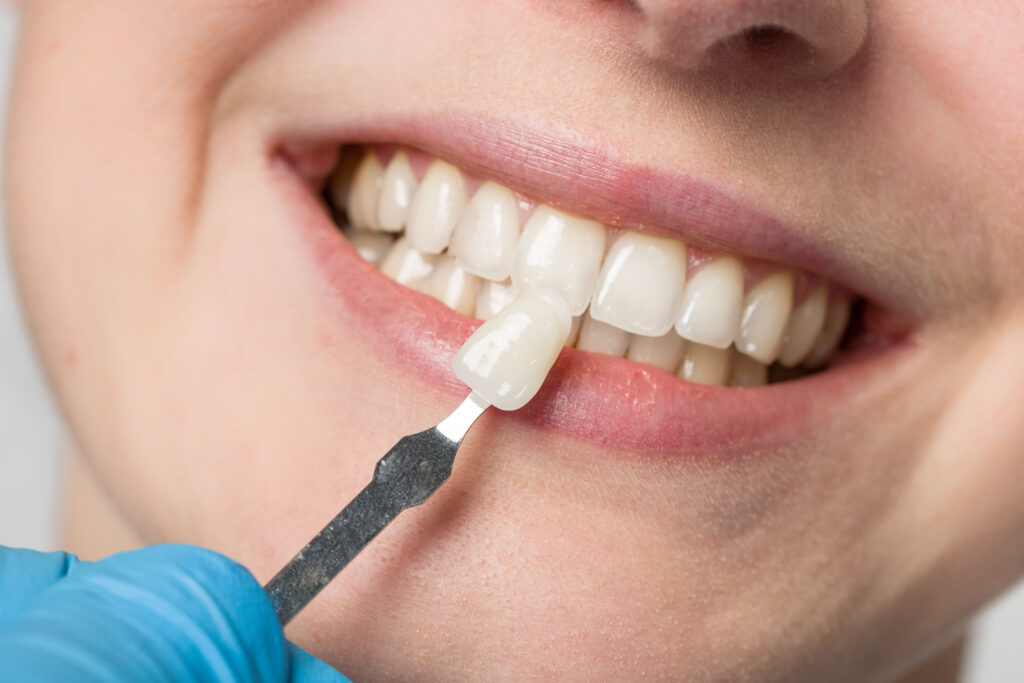
Introduction
Have you ever looked at a photograph of a celebrity flashing their brilliant smile and wondered, “How can I achieve that perfect smile too?” Maybe you’ve scrolled through your social media feed and felt a pang of envy at your friend’s flawless, confident grin. It’s no secret that a radiant smile can be a huge confidence booster. But how can you get that perfect smile you’ve always dreamed of?
One popular and effective solution is dental veneers. These thin, custom-made coverings can address various dental concerns, including chipped, discolored, or misaligned teeth, offering a significant smile transformation. But, like many, you might have hesitations. You’ve heard about veneers, but you know they might cause teeth sensitivity. This concern is common and keeps many from leaping to a more attractive smile.
If you find yourself in this situation, we’re here to assure you that you’re in the right place. This blog post delves into the connection between veneers and teeth sensitivity, what you should expect, and how to effectively manage it. So let’s shed some light on these topics and help you make an informed decision about your dental health and aesthetic goals.
What are Veneers?
Imagine having a façade for your teeth designed to your specifications, giving you that perfect smile you’ve always dreamed of. That’s exactly what dental veneers are. Veneers are ultra-thin shells that are meticulously crafted and adhered to the front surface of your teeth. They serve as a protective, cosmetic shield, enhancing the aesthetics of your smile and providing a natural look that blends seamlessly with the rest of your teeth.
The materials used to fabricate veneers are usually porcelain or composite resin. Porcelain veneers are highly durable, stain-resistant, and can closely mimic the light-reflecting properties of natural teeth, making them a popular choice. On the other hand, composite resin veneers can be applied in a single office visit and are more cost-effective, making them a viable option for many.
Veneers are designed to address a variety of dental imperfections. Do you have teeth that are discolored and resist professional whitening procedures? Veneers can give you a brighter, whiter smile. If you have chips, cracks, or minor misalignment, veneers can help camouflage these flaws, providing a smoother and more uniform appearance. Additionally, they can close gaps between teeth that orthodontic treatment might not be necessary for. Veneers can restore the shape and length of those with misshapen or worn-down teeth, creating a more balanced and symmetrical smile.
In essence, veneers are a powerful tool in cosmetic dentistry, capable of offering a comprehensive smile makeover. They are customized to match your teeth’ size, shape, and color, ensuring that your transformed smile looks as natural as possible.
The Connection Between Veneers and Teeth Sensitivity
When considering veneers, it’s important to understand that the process involves a certain degree of tooth preparation. To ensure the veneers bond properly and look natural, a thin layer of your tooth’s enamel may need to be removed. This is a precise process by your dentist to ensure the veneers fit seamlessly onto your teeth.
Enamel, the outermost layer of your teeth, acts as a shield, protecting the inner layers of your teeth from daily wear and tear and sensitivity to temperature and certain foods. When a part of this hard protective shell is removed, it exposes the dentin – the sensitive inner part of the tooth. The dentin contains microscopic tubules that, when exposed, allow stimuli like heat, cold, or certain types of foods and beverages to reach the nerves inside the tooth more directly. This can make your teeth more sensitive to temperature extremes or certain food types than before the procedure.
You might feel a zing when sipping your morning coffee or biting into an ice cream cone. Sweet treats could suddenly trigger a sharp, quick discomfort, and acidic foods like citrus fruits may cause an unexpected pang. It’s important to remember that this is a common experience for many people after getting veneers, and it does not necessarily mean anything wrong. Most importantly, some measures can be taken to manage and alleviate this sensitivity, which we’ll explore later in this blog post.
What to Expect
Now that we’ve explored the link between veneers and teeth sensitivity let’s discuss what you should expect post-procedure. It’s important to remember that every person’s experience can be different, as we all have unique dental and overall health conditions. However, there are a few common experiences you can anticipate.
Right after the procedure, when the effects of any local anesthesia used during the process start to wear off, you may notice increased sensitivity in your teeth. This is entirely normal and results from removing a small amount of enamel and attaching the new veneers.
In the early days following the procedure, you might feel slightly more discomfort when eating or drinking hot, cold, sweet, or acidic food and drinks. Even the cool air can cause an itch if you’re not used to it. For some, this sensation might extend beyond mere sensitivity to mild discomfort or pain. However, it’s important to remember that this is usually temporary.
The duration of the sensitivity can vary. For some, it may last only a few days. For others, it could persist for a couple of weeks. But don’t be alarmed – this is common and expected. It’s part of the adjustment period where your mouth gets used to the new veneers.
In most cases, the sensitivity gradually decreases as your teeth and gums become accustomed to the veneers. Your mouth is an incredibly adaptable part of your body and typically adjusts to these new additions. With proper care and patience, your mouth will soon feel just like before the procedure – except now, you’ll be sporting a brand-new, flawless smile.
It’s important, however, to maintain open communication with your dentist. You should contact them if your sensitivity is extreme or persists beyond a few weeks. They can help determine if an underlying issue needs addressing or offer solutions to manage your sensitivity more effectively.
How to Manage Teeth Sensitivity After Veneers
The sensitivity caused by veneers is usually temporary and manageable. Here are a few tips to help you cope:
Switch to a Desensitizing Toothpaste
There are toothpaste specially formulated for sensitive teeth. They contain ingredients that help block the transmission of sensation from the tooth surface to the nerve.
Avoid Extreme Temperatures
Avoid very hot or cold foods and beverages as they may increase sensitivity. Give your mouth time to adjust to the veneers.
Be Gentle While Brushing
A soft-bristled toothbrush will be gentler on your teeth and gums. Brush gently around the gum line where the veneers meet your gums.
Regular Dental Check-ups
Regular visits to the dentist can help manage teeth sensitivity. They can monitor your condition and suggest suitable treatments or changes in your oral care routine.
Conclusion
Veneers can significantly improve your smile, but it’s crucial to understand the possible side effects, including teeth sensitivity. Fortunately, this sensitivity can be managed effectively with the right care and adjustments to your dental routine.
For those considering veneers or experiencing sensitivity after the procedure, Kelly Dental PC is here to help. Our team of experienced dental professionals can provide you with personalized care and guidance. Visit us at kellysmiledesign.com to learn more and book your appointment today. Let us help you navigate the journey to your perfect smile easily and comfortably.












